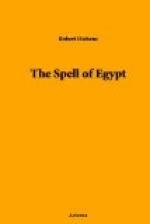And we all worship as yet in the dark, as in the exquisite dark, like faith, of the Holy of Holies of Horus.
XVI
PHILAE
As I drew slowly nearer and nearer to the home of “the great Enchantress,” or, as Isis was also called in bygone days, “the Lady of Philae,” the land began to change in character, to be full of a new and barbaric meaning. In recent years I have paid many visits to northern Africa, but only to Tunisia and Algeria, countries that are wilder looking, and much wilder seeming than Egypt. Now, as I approached Assuan, I seemed at last to be also approaching the real, the intense Africa that I had known in the Sahara, the enigmatic siren, savage and strange and wonderful, whom the typical Ouled Nail, crowned with gold, and tufted with ostrich plumes, painted with kohl, tattooed, and perfumed, hung with golden coins and amulets, and framed in plaits of coarse, false hair, represents indifferently to the eyes of the travelling stranger. For at last I saw the sands that I love creeping down to the banks of the Nile. And they brought with them that wonderful air which belongs only to them—the air that dwells among the dunes in the solitary places, that is like the cool touch of Liberty upon the face of a man, that makes the brown child of the nomad as lithe, tireless, and fierce-spirited as a young panther, and sets flame in the eyes of the Arab horse, and gives speed of the wind to the Sloughi. The true lover of the desert can never rid his soul of its passion for the sands, and now my heart leaped as I stole into their pure embraces, as I saw to right and left amber curves and sheeny recesses, shining ridges and




